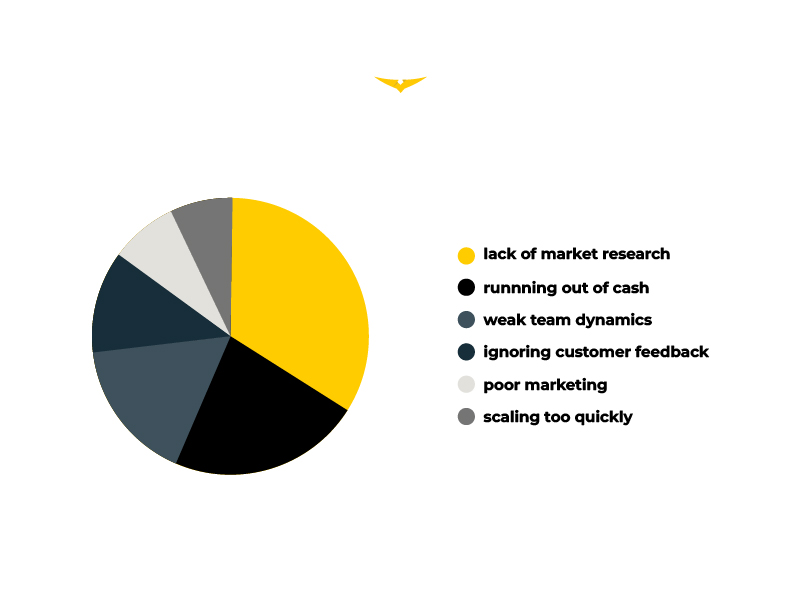Launching a startup is like setting sail on a thrilling expedition toward financial independence and entrepreneurial success. The journey is filled with dreams, hope, and the idea of creating something new. Yet, the sobering truth remains that 90% of startups meet their demise before they can truly spread their wings.

However, here, we’ll unveil the mysteries behind these startup failures and provide you with insights to ensure you become one of the esteemed 10% that rises above the odds.
Here are some reasons why startups fail and how to avoid failure:
- Lack of market research
- Running out of cash
- Weak team dynamics
- Ignoring customer feedback
- Scaling too quickly
- Poor marketing

1. Lack of Market Research
Think about it: opening a lemonade stand in the middle of winter would hardly attract thirsty customers. This analogy perfectly sums up the fate of startups that dive headfirst into business without conducting thorough market research. Startlingly, 31.8% of startups fall into this trap, primarily because they fail to understand their target market and its demands.
Tip: To steer clear of this pitfall, make market research your trusted compass. Dive deep into understanding your target audience, study your competition, and stay informed about industry trends. Employ tools such as surveys, focus groups, and online research to gather valuable insights. A well-informed start is a head start.
2. Running Out of Cash
They say money makes the world go round, and in the startup realm, it certainly does. About 22% of startups fail because they don’t have enough money. Sometimes, they spend too much or don’t make as much money as they thought.
Tip: To avoid going broke, make a detailed plan for how you’ll spend every dollar. Stick to your plan and always keep some extra money for unexpected costs. You can also ask for money from investors, get a loan, or even take advantage of startup discounts and deals to help your business.
3. Weak Team Dynamics
Imagine a soccer team where each player runs in a different direction, competing against their own teammates. This mess happens a lot in startups, and it causes about 17% of them to fail.
Tip: It’s really important to have a strong team that works well together. Find people who share your vision and work together. Talk to each other and help each other. A good team is like a secret weapon for making your startup work.
4. Ignoring Customer Feedback
In the grand theater of business, customers take center stage. 10.6% of startups meet their demise because they fail to listen to the voices of their customers.
Tip: Talk to your customers and ask them what they think about your product or service. Listen to what they say and improve your business based on their feedback. Happy customers will tell others about your business.
4. Scaling Too Quickly
While growth is undoubtedly the goal, expanding too rapidly can be close to running before you can walk. Approximately 8% of startups stumble into failure due to overambitious scaling efforts, which stretch resources and create organizational chaos.
Tip: Embrace a strategy of gradual, sustainable growth. Ensure that your infrastructure, team, and resources can support expansion without compromising the quality of your product or service. Patience can be the cornerstone of long-term success.
6. Poor Marketing
Even the most innovative and exceptional products can flounder if they remain hidden in the shadows. Bad marketing is responsible for 10.6% of startup failures.
Tip: Develop a comprehensive marketing strategy that includes digital marketing, social media campaigns, content marketing, and outreach efforts. Creating visibility and reaching your target audience effectively can be the key to turning your startup into a household name.
Summing up
Starting a business can be hard, but if you’re careful and avoid common mistakes like not researching the market, managing money poorly, and not listening to customers, you can be one of the 10% of startups that succeed. Remember that failing can help you learn and grow, and being flexible and strong will help you on your business journey. Keep going, and with the right approach, you can succeed in the competitive world of startups.

